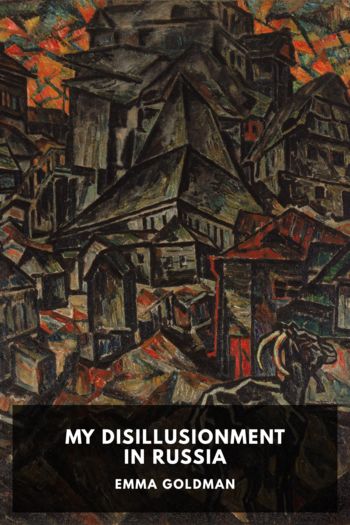The Conquest of Bread by Peter Kropotkin (the best electronic book reader .TXT) 📕

- Author: Peter Kropotkin
Book online «The Conquest of Bread by Peter Kropotkin (the best electronic book reader .TXT) 📕». Author Peter Kropotkin
By Peter Kropotkin.
Translated by Chapman and Hall.
Table of Contents Titlepage Imprint Preface The Conquest of Bread I: Our Riches I II III II: Well-Being for All I II III III: Anarchist Communism I II IV: Expropriation I II III V: Food I II III IV V VI VII VI: Dwellings I II III VII: Clothing VIII: Ways and Means I II IX: The Need for Luxury I II III IV V X: Agreeable Work I II XI: Free Agreement I II III XII: Objections I II III IV XIII: The Collectivist Wages System I II III IV XIV: Consumption and Production I II XV: The Division of Labour XVI: The Decentralization of Industry I II III XVII: Agriculture I II III IV V VI Endnotes Colophon Uncopyright ImprintThis ebook is the product of many hours of hard work by volunteers for Standard Ebooks, and builds on the hard work of other literature lovers made possible by the public domain.
This particular ebook is based on a transcription produced for Project Gutenberg and on digital scans available at the Internet Archive.
The writing and artwork within are believed to be in the U.S. public domain, and Standard Ebooks releases this ebook edition under the terms in the CC0 1.0 Universal Public Domain Dedication. For full license information, see the Uncopyright at the end of this ebook.
Standard Ebooks is a volunteer-driven project that produces ebook editions of public domain literature using modern typography, technology, and editorial standards, and distributes them free of cost. You can download this and other ebooks carefully produced for true book lovers at standardebooks.org.
PrefaceOne of the current objections to Communism, and Socialism altogether, is that the idea is so old, and yet it has never been realized. Schemes of ideal States haunted the thinkers of ancient Greece; later on, the early Christians joined in communist groups; centuries later, large communist brotherhoods came into existence during the Reform movement. Then, the same ideals were revived during the great English and French Revolutions; and finally, quite lately, in 1848, a revolution, inspired to a great extent with Socialist ideals, took place in France. “And yet, you see,” we are told, “how far away is still the realization of your schemes. Don’t you think that there is some fundamental error in your understanding of human nature and its needs?”
At first sight this objection seems very serious. However, the moment we consider human history more attentively, it loses its strength. We see, first, that hundreds of millions of men have succeeded in maintaining amongst themselves, in their village communities, for many hundreds of years, one of the main elements of Socialism—the common ownership of the chief instrument of production, the land, and the apportionment of the same according to the labour capacities of the different families; and we learn that if the communal possession of the land has been destroyed in Western Europe, it was not from within, but from without, by the governments which created a land monopoly in favour of the nobility and the middle classes. We learn, moreover, that the medieval cities succeeded in maintaining in their midst, for several centuries in succession, a certain socialized organization of production and trade; that these centuries were periods of a rapid intellectual, industrial, and artistic progress; while the decay of these communal institutions came mainly from the incapacity of men of combining the village with the city, the peasant with the citizen, so as jointly to oppose the growth of the military states, which destroyed the free cities.
The history of mankind, thus understood, does not offer, then, an argument against Communism. It appears, on the contrary, as a succession of endeavours to realize some sort of communist organization, endeavours which were crowned here and there with a partial success of a certain duration; and all we are authorized to conclude is, that mankind has not yet found the proper form for combining, on communistic principles, agriculture with a suddenly developed industry and a rapidly growing international trade. The latter appears especially as a disturbing element, since it is no longer individuals only, or cities, that enrich themselves by distant commerce and export; but whole nations grow rich at the cost of those nations which lag behind in their industrial development.
These conditions, which began to appear by the end of the eighteenth century, took, however, their full development in the nineteenth century only, after the Napoleonic wars came to an end. And modern Communism has to take them into account.
It is now known that the French Revolution, apart from its political significance, was an attempt made by the French people, in 1793 and 1794, in three different directions more or less akin to Socialism. It was, first, the equalization of fortunes, by means of an income tax and succession duties, both heavily progressive, as also by a direct confiscation of the land in order to subdivide it, and by heavy war taxes levied upon the rich only. The second attempt was a sort of Municipal Communism as regards the consumption of some objects of first necessity, bought by the municipalities, and sold by them at cost price. And the third attempt was to introduce a wide national system of rationally established prices of all commodities, for which the real cost of production and moderate trade profits had to be taken into account. The Convention worked hard at this





Comments (0)